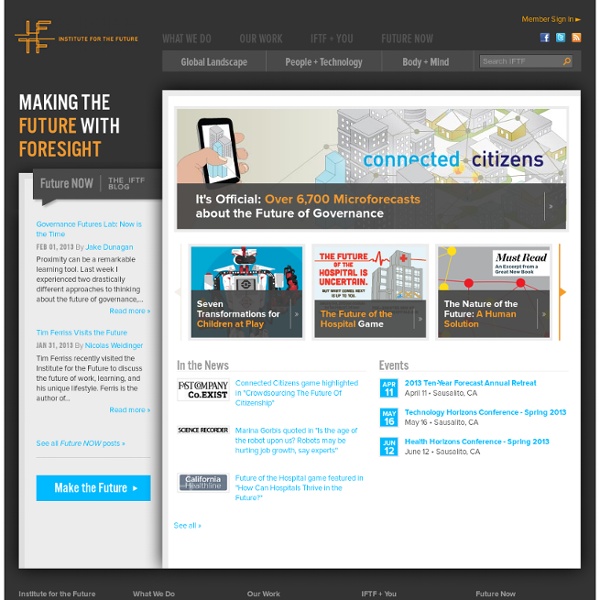



Scenarios 2020 Why are past, present, and future our only options? But things get awkward if you have a friend. (Use your imagination if necessary.) Low blow, Dr. Dave. But seriously, I always figured if there was more than one dimension of time, that moving "left" or "right" would be the equivalent of moving to a parallel universe where things were slightly different. That is to say, maybe time really is 2 dimensional, but for all the reasons you mention, we're normally only aware of one of them—and for the most part, the same one that most of the people we meet are aware of. But take, say, a schizophrenic person—maybe they're tuned in differently; moving sideways through time instead of forward... or maybe moving through (and aware of) both simultaneously. They can't form coherent thoughts because they're constantly confronted with overlapping and shifting realities. I dunno... that's all just speculation, of course, but I find that thought fascinating.
DavidSibbet.com Happiness ‘wave’ crests at retirement Share this Article You are free to share this article under the Attribution 4.0 International license. U. QUEENSLAND (AUS) — People are at their happiest at retirement age and their most miserable in their geriatric years, according to a new study that shows how happiness changes over a lifetime. The study also debunks the idea of the middle-age blues, blaming an over-representation of unhappy respondents in previous surveys. Collecting data from more than 60,000 people in Australia, Britain, and Germany, researchers found people were happiest as they entered retirement age (55-75), and most miserable close to death (80-90). [sources] “We all strive toward happiness, but we wanted to find out at what point in life we actually reach this goal,” says Tony Beatton of Queensland University of Technology. Paul Frijters of the University of Queensland is a co-author of the paper that is published in the Journal of Economic Behavior and Organization.
Think Global / Act Local & Communicate Digitally / Connect Analogue - A 360 Degree View of Thinque's Solutions Recently, we have had the privilege and fortune of connecting globally and locally with multinational organisations in a diverse range of markets. Technology combined with future-minded human connectedness and connection is making this possible. Recent projects we have been working on have included a national 'Thought Leadership and Social Media Marketing' roadshow for one of the world's leading financial services organisations, scenario planning with Australia's leading bank, a 'leadership styles' program with an American pharmaceutical company, employer branding advice for one of the world's thought leading HR companies, executive coaching with pharmaceutical leaders, and an international innovation roadshow with an American-Japanese printing and digital solutions provider. Given the depth, breadth and global nature of these programs, we thought it apt to visually demonstrate some of the services and solutions that we offer at Thinque.
gavinkeech: Polytopia Project Map GEN010 This iteration/generation of the Polytopia Project map (derived from notthisbody's conversation mapping +) was designed by utilising the raw information distributed to me in Australia, as it emerged in Italy, during the lead up to the Polytopia Presentation to be handed out (printed) at the TransVision 2010 conference. notthisbody, wildcat, spaceweaver and starwalker over the course of the weekend (back in the day), sent live voice recordings and ongoing 'generational conversation maps' of their discussions which consisted of distilled analysis of core values for what the Polytopia Project encompasses. Working along side them over the couple of days and integrating the highly distilled, yet raw information from their live analysis of terms, fundamental values of what the polytopia project stands for, was a great experience and one i was stoked to be involved with. The Polytopia Project map gen010 can be downloaded here … (PDF) (JPG)
Polytopia - Our Mind Habitat in the Infoverse by I M on Prezi Observatoire des inégalités Revista de Investigación en Gestión de la Innovación y Tecnología. ESTRATEGIAS, CONOCIMIENTOS E INNOVACIÓN. Número 19, octubre - noviembre 2003. 1. Introducción: La gestión del conocimiento y la estrategia. En la última década se ha escrito mucho acerca de conocimiento organizativo en general y de Gestión del Conocimiento en particular (especialmente en los últimos tres o cuatro años), en un intento de posibilitar la concienciación de la importancia de este asunto para las empresas, ayudándolas en la implantación de proyectos dirigidos al conocimiento. Para cualquier empresa, conseguir posicionarse y permanecer viva en el mercado globalizado (donde paradigmas como el tiempo, la distancia y el espacio fueron rotos con la realidad de las tecnologías de la información) es un objetivo primordial. Para Mendes (2002), en esta nueva realidad, el factor humano impera en las organizaciones, ya que es el único recurso disponible capaz de tener perspicacia, presuponer o inferir. En lo que respecta a este trabajo, nuestra pretensión es: 2. Estos tres conceptos, desde el punto de vista estratégico, se diferencian fundamentalmente: Figura 1. 3.